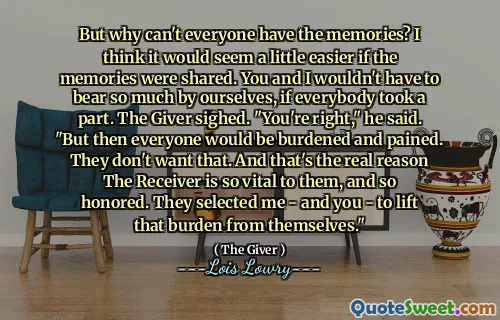
Jonas reached the opposite side of the river, stopped briefly, and looked back. The community where his entire life had been lived lay behind him now, sleeping. At dawn, the orderly, disciplined life he had always known would continue again, without him. The life where nothing was ever unexpected. Or inconvenient. Or unusual. The life without color, pain, or past.
This quote from The Giver beautifully encapsulates a profound moment of transition, highlighting the tension between safety and freedom. Jonas's journey across the river symbolizes crossing over from the familiar into the unknown — leaving behind a world of controlled predictability. There's a haunting portrayal of the community as 'sleeping,' suggesting ignorance or complacency, contrasted sharply with Jonas becoming awake to the complexities of real life. The description of the community's life as orderly and devoid of unexpectedness, inconvenience, or unusual occurrences suggests a society that values sameness and control above all else. While this gives a veneer of peace and stability, the absence of color, pain, or past points to a loss of individuality, emotion, and history — essential components that enrich the human experience. The line forces the reader to contemplate the price of such an existence: is a life without pain truly better if it also lacks color and depth? Jonas's act of looking back implies a mixture of nostalgia, regret, or hope, illustrating the bittersweet nature of change. It invites a deep reflection on the choices we make, the value of experiencing the full spectrum of life, and the courage required to step beyond the safety of conformity into the uncertainty of freedom. Overall, this passage resonates as a powerful meditation on growth, sacrifice, and the essence of what it means to live fully.








